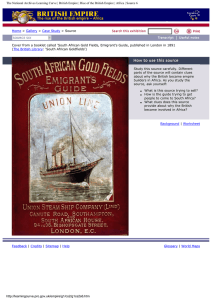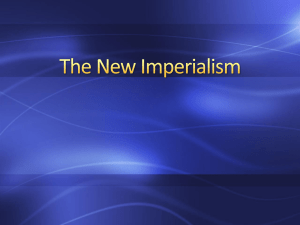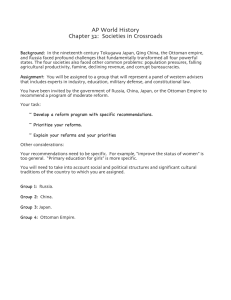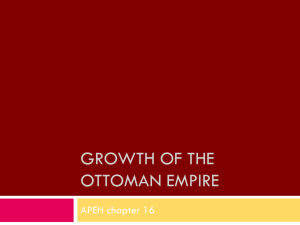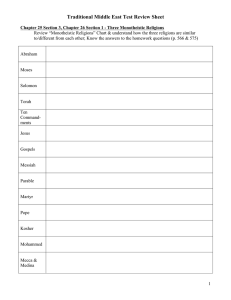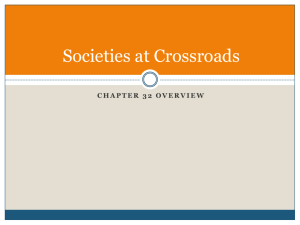Chapter 25 – The New Imperialism
advertisement
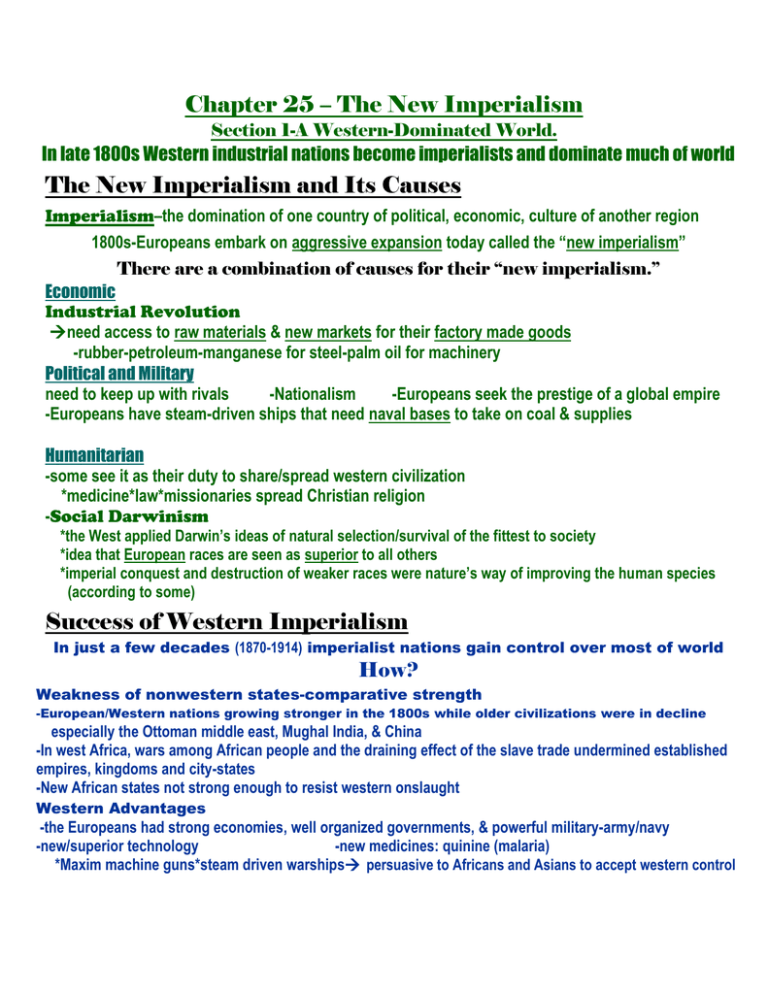
Chapter 25 – The New Imperialism Section 1-A Western-Dominated World. In late 1800s Western industrial nations become imperialists and dominate much of world The New Imperialism and Its Causes Imperialism–the domination of one country of political, economic, culture of another region 1800s-Europeans embark on aggressive expansion today called the “new imperialism” There are a combination of causes for their “new imperialism.” Economic Industrial Revolution need access to raw materials & new markets for their factory made goods -rubber-petroleum-manganese for steel-palm oil for machinery Political and Military need to keep up with rivals -Nationalism -Europeans seek the prestige of a global empire -Europeans have steam-driven ships that need naval bases to take on coal & supplies Humanitarian -some see it as their duty to share/spread western civilization *medicine*law*missionaries spread Christian religion -Social Darwinism *the West applied Darwin’s ideas of natural selection/survival of the fittest to society *idea that European races are seen as superior to all others *imperial conquest and destruction of weaker races were nature’s way of improving the human species (according to some) Success of Western Imperialism In just a few decades (1870-1914) imperialist nations gain control over most of world How? Weakness of nonwestern states-comparative strength -European/Western nations growing stronger in the 1800s while older civilizations were in decline especially the Ottoman middle east, Mughal India, & China -In west Africa, wars among African people and the draining effect of the slave trade undermined established empires, kingdoms and city-states -New African states not strong enough to resist western onslaught Western Advantages -the Europeans had strong economies, well organized governments, & powerful military-army/navy -new/superior technology -new medicines: quinine (malaria) *Maxim machine guns*steam driven warships persuasive to Africans and Asians to accept western control Resistance -African and Asians strongly resisted western expansion into their lands -some fought invaders even though they had no weapons equal to machine gun -ruling groups tried to strengthen their societies by reforming their own Muslim, Hindu, or Confucian traditions -Western educated Africans and Asians organized nationalist movements to expel imperialists from their lands Forms of Imperial Rule 1. Colonies -Direct rule-used by France-officials & soldiers sent to rule & impose culture -Indirect rule-used by Britain-local rulers are kept in place to administer the colony 2. Protectorates -Local rulers are left in place but expected to obey European advisers 3. Spheres of Influence -country claims exclusive rights/privileges in a region 25-2-The Partition of Africa. Africa in the early 1800’s- before European domination -Africa- huge continent, 4 times larger than Europe -people speak hundreds of languages and developed varied governments across the region -some lived in large centralized states, others in village communities Slave trade Early 1800’s – European nations began to outlaw transatlantic slave trade -Britain & USA helped freed slaves resettle in Africa 1787-the British organized Sierra Leone in West Africa as a colony for former slaves 1847-Liberia-former U.S. slaves-becomes independent republic European Contact Increases Known as the “dark continent”—Why? -1500s-1700s-Europeans traded along the African coast -difficult geography and diseases kept them from reaching the interior -Medical advances and river steamships changed that in the 1800’s Explorers-early 1800’s-European explorers began pushing into interior -set out to map the course and sources of great African rivers such as the Niger, Nile, and Congo -explorers were fascinated by African geography -had little understanding of the people they met -best known explorer-missionary was Dr. David Livingstone- blazed a trail that others soon followed -for 30 years he crisscrossed Africa writing about the many people he met -had more sympathy and less bias than most Europeans -relentlessly opposed the slave trade -wanted to open up the interior of Africa to Christianity and trade -1869- journalist Henry Stanley trekked into Central Africa to find Livingstone & finally tracked him down in 1871 in what is today Tanzania, greeting him with “Dr. Livingstone I presume?” Missionaries Catholic and Protestant missionaries followed the explorers seeking to convert people to Christianity -Missionaries were sincere in desire to help the African people -built schools, medical clinics alongside churches-focused on the evils of the slave trade -paternalistic view of Africans – as children who needed guidance -urged Africans to reject their own traditions in favor of Western civilization African Resistance to Imperialism -successful resistance was mounted in Ethiopia -Ancient Christian kingdom had survived in the highlands of East Africa -like feudal Europe, it had been divided up among a number of rival princes -late 1800’s – a reforming ruler Menelik II began to modernize his country -he hired European experts to plan modern roads and bridges and set up a western school system -Imported the latest weapons and officers to help train his army when Italy invaded Ethiopia in 1896 Menelik was prepared -Battle of Adowa-Ethiopians crush the Italian invaders *Ethiopia was the only African nation aside from Liberia to preserve its independence* A Scramble for Colonies -King Leopold II (1835-1909) later hires Stanley to explore Congo and arrange treaties *1885- Leopold II-king of Belgium-becomes king of independent state of Congo -Belgium government takes over in 1908 due to Belgian exploitation King Leopold’s activities in Congo sets off “scramble” of other European nations Berlin Conference -Europeans want to avoid bloodshed in the rush to colonize Africa hold an international conference *No Africans are invited to the meeting -Europeans come to agreement regarding: * Leopold’s private claims to Congo Free State * Free trade on the Congo and Niger rivers * European nations need an office in any claimed territory Boer War -late 1800s: Britain, France, Germany, other European powers swept into Africa -despite resistance tribal chiefs couldn’t prevent European conquest -within 20 years, Europeans had carved up the continent and dominated millions of Africans 25-3 European Challenges to the Muslim World 29-2—Nationalists Movements in Africa & the Mile East The period after WWII marked the final collapse of European imperialism. In Africa, independence was achieved both through peaceful efforts & through bloody conflicts. In South Africa, years of racial segregation ended & black South Africans gained a voice in government. A movement called Pan-Africanism-the unity of Africans & people of African descent all over the world had been nourishing nationalist movements in Africa since the 1920s. A few African nations achieved independence before 1945, most gained independence after WWII. -many Africans fought in WWIIresented returning home to second-class citizenship For nearly 350 years Europeans ruled South Africa -although South Africa won independence from Britain in 1910 only its white citizens held political power -in 1948 a system of apartheid-separation of the races was made official white South Africans control the nation’s government & economy -black South Africans and other nonwhites *lived in certain zones-kicked off their own landforced to live on crowded reserves *used segregated public facilities & transportation *forbid interracial marriage *had to carry ID cards *forced off the best land *restrictions on travel *not allowed to grow most profitable crops forced to grow cash crops not producing enough food famine *better paying jobs in mines went to whites onlyleft blacks with low-pay, less-skilled work *not allowed to vote 1912-educated Africans organize a political party-African National Congres ANC -to oppose apartheid the ANC used *legal means to protest unjust laws that restrict the freedom of black South Africans *violence *non-violent civil disobedience *boycotts 1960-demonstration in Sharpeville-police killed 69 people & wounded 180 South African government reacted by outlawing the ANC 1964-Nelson Mandela-important ANC leader sentenced to life in prison became a powerful symbol of the struggle for freedom 1976-in Soweto township thousands of students peacefully protest the South African police respond with force the accounts of how many people died vary from 200 to 600 -the original government figure claimed only 23 students were killed -the number of wounded was estimated to be over a thousand men, women, and children The Soweto Uprising was a turning point in the liberation struggle in South Africa -many white South African citizens were outraged at the government's actions in Soweto about 300 white students from the University of the Witwatersrand marched through Johannesburg's city centre in protest of the killing of children black workers went on strike as well and joined them as the campaign progressed riots also broke out in the black townships of other cities in South Africa June 16th is now a public holiday called Youth Day in South Africa in remembrance of the events in 1976 Desmond Tutu-black Anglican bishop & civil rights leader along with other activists convinced foreign nations & businesses to limit trade & investment in segregated S. Africa over time these nonviolent means of protest had a strong effect 1989-F.W. de Klerk became president of South Africa -he knew reform was necessary he legalized the ANC repealed segregation laws released Mandela from jail in 1990 1994-South Africa held an election in which people of all races could vote Mandela was elected president The South African Truth and Reconciliation Commission TRC was set up by the new South African government -help deal with the violence & human rights abuses which occurred under apartheid -discover/reveal past wrongdoing by the government in the hope of resolving conflict left over from the period of apartheid 25-3 European Challenges to the Muslim World 29-2—Nationalists Movements in Africa & the Mile East The European powers who carved up Africa among themselves also looked elsewhere to see what other lands they could control 1453-the Ottomans captured Constantinople & overthrew the Byzantine empire -->over the next 200 years the Ottoman Empire built a large & powerful empire At its height the Ottoman Empire extended across North Africa, SE Europe, & parts of the Middle East Nationalist Revolts -ideas of nationalism spread from Western Europe -internal revolts due to nationalism weaken the multi-ethnic Ottoman Empire *different ethnic groups threatened to break away *revolts erupt throughout the empire -1830-Greece gained independence & Serbia gained self-rule --> these internal revolts by subject peoples weakened the empire -->the Ottomans’ weakness was becoming apparent to European powers -->known as the “sick man of Europe” -->European countries took advantage of this weakness to grab Ottoman territory The declining empire had difficulties trying to fit into the modern world Observing the slow decline of the Ottoman Empire, some Muslim leaders decided that their countries would either have to adjust to the modern world or be consumed by it These countries initiated political & social reforms to block European domination of their lands -->they looked to the West for ideas Egypt Seeks to Modernize Modernization came to Egypt as a result of the interest in the area created by the French Revolution -strategic location at the head of the Red Sea After Napoleon failed to win Egypt a new leader emerged-Muhammad Ali -broke away from Ottoman control *successful reformer-known as the “father of modern Egypt” -modernized and westernized Egypt-political, military, & economic changes -before he died in 1849 he set Egypt on the road to becoming a major Middle Eastern power -unfortunately his successors were less skilled-->Egypt came increasingly under foreign control -Ali’s grandson Isma’il continued modernization efforts -->1858-French entrepreneur Ferdinand Lesseps organized a company to build the Suez Canal -->Isma’il supported the construction of the Suez Canal -a 100 mile man-made waterway connecting the Red Sea to the Mediterranean-opened in 1869 -->would shorten the travel distance from W. Europe to ports in E. Africa & Asia -->European ships would no longer have to sail around the southern tip of Africa -->reduced the trip from London, England to Bombay, India by 5,150 miles -Isma’il’s modernization efforts/projects were extremely expensive European nations extended loans at high interest rates -->soon Egypt was unable to repay loans contracted for the canal & other projects *could not even pay the interest on its $450 million debt -->sold shares in the canal -->Britain bought the shares-->gaining a controlling interest in the canal 1882 Egypt became a protectorate of Britain Turkish Nationalism -ideas of nationalism spread from Western Europe A group of liberals in the 1890s established a movement called the Young Turks -->in 1908 they overthrew the sultan & took control of the government -wanted to strengthen the Ottoman Empire & end the threat of western imperialism -believe the only way to save the empire is to reform -WWI begins-->unable to achieve reforms Increasing Turkish nationalism -->problems Traditionally the Ottomans let minority nationalities live in their own communities & practice their own religions Yet by the 1890s nationalism was igniting new tensions especially between Turkish nationalists & minority groups that wanted their own states the Ottomans abandoned their tradition of tolerance of diverse cultures & religions Armenians-Christians living in the eastern portion of the empire (minority) Muslim Turks (majority) distrusted the Christian Armenians (minority) -accused the Armenians of supporting Russian plans against the Ottoman Empire -the Armenians protested repressive Ottoman policies -->the sultan had tens of thousands of Armenians slaughtered -->eventually over a million Armenians are killed *Genocide-the deliberate attempt to destroy an entire ethnic or religious group Mustafa Kemal-general & war hero in Turkey -post WWI led Turkish nationalist movementoverthrew the sultan & defeated western occupation forces declared Turkey a republic changed his name to Ataturk-meaning “father of the Turks” -wanted to modernize & westernize Turkey-believed Turkey had to change to survive *replace Muslim calendar w/western calendar. *replace day of rest from Friday to Sunday *forced to wear western clothes *closed religious schools & open state schools *built up industry-RR-factories Changes for Women -no longer have to veil faces -allowed to vote -polygamy banned The Ottoman Empire eventually collapsed in 1918 -most of the Arab lands within the empire were put under the control of Br. & Fr. -the remainder of the empire became the country of Turkey Like the Ottoman Empire, Iran (Persia) faced major challenges Nationalists in Iran followed Turkey's lead -In 1925, Reza Khan overthrew the shah (ruler) of Iran and proclaimed himself shah -he modernized & westernized Iran despite opposition from Muslim religious leaders _________________________________________________________________________________________________________________________________________________________________________________________________________________________________________________________________________________________________________________________________________________________________________________________________________________________________________________________________________________________________________________________________________________________________________ Arab Nationalism Arab nationalists sought to be free of foreign control -During World War I many Arabs had helped the Allies in return they had been promised independence Instead Britain & France took over territories throughout the Middle East a movement called Pan-Arabism-desire to unite all Arabs in their own state Promises made by the Allies during World War Ia great conflict in the British mandate of Palestine Britain occupied Palestine during WWI -To gain their support in WWI the Allies promised the Arab people control of their own land-Palestine -In order to gain the support of European Jews the British also issued the Balfour Declaration which pledged to set up a Jewish nation in the same region-Palestine -Zionist movement-promoted the idea of establishing a homeland for the Jewish people in Palestine because of the increasing anti-Semitism throughout Europe Jews began migrating back to Palestine joining the small Jewish community that had survived there since biblical times in the 1930s many Jews moved from Europe to Palestine to escape Nazi persecution during WWII Jewish immigration to Palestine continued post WWII the Jewish population in Palestine was increasing The UN voted to split Palestine establishing both a Jewish and Arab state in Palestine Israelis believe they are entitled to the land now known as Israel Palestinians believe they are entitled to the land they call Palestine Jewish Israelis and Muslim Palestinians both believe that God gave them the land to give it away or give it up is an insult to God and a sin Even now Arab and Jewish nationalists battle over this same land each war, each death, each act of terrorism, only deepens the hatred and the reluctance to give in to the other side
